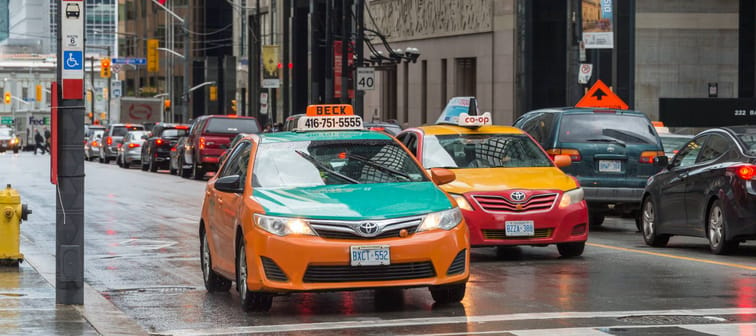Taxi scam
During the holiday season, you’re no doubt busy and distracted. This combination makes you a better mark for con artists, who take advantage of people when they’re least likely to notice.
It was after hours in early December when Binks-Collier and his friends were taking a cab home in downtown Toronto. They didn’t believe for a second they were falling victim to a con.
“It very much looked like a real cab,” he noted. “We got in and the driver was nice, sort of chatting about himself.”
The friendly atmosphere and the fact that the car perfectly resembled a taxi created trust. So when the driver casually asked for his debit card to process the payment, Binks-Collier had no reason to question it.
“I saw him take the card, put it in the machine [...] I didn't see it for about a second or two.”
But the card that was returned wasn’t his own. This fact wasn’t discovered until the next day when he was checking his banking online.
“I couldn't actually access my account. And only then was I very confused.”
“Money can be recouped,” he says, “it's just so frustrating […] that lack of trust that is spawned by scam artists.”
Empower your investments with Qtrade
Discover Qtrade's award-winning platform and take control of your financial future. With user-friendly tools, expert insights, and low fees, investing has never been easier.
Start Trading TodayWays to avoid the taxi scam
Binks-Collier has a few pieces of advice, so you can learn from his mistake.
“The best thing that you can do is get taxi numbers, as well as licence plate numbers,” he suggests.
He also recommends checking the identity of the cab driver posted on the back of their seat, and “double checking stuff when you get out of the cab just to make sure that you do have what's yours.”
As for how the incident left Binks-Collier feeling: “It still made me not want to really ever take one again. And if I did, just being hyper cautious,” he states.
“When it's $3,000 that gets taken, I think it's understandable to act like that.”
The con Binks-Collier fell victim to is one of many to be aware of this holiday season. There have been news reports surrounding the taxi cab scam, but there are others that are actively taking place.
Fake gift cards
Making the news recently is a gift card fraud in which fake barcodes are pasted on the backs of actual gift cards at retail outlets.
When you purchase a card, you believe you’re activating the gift card in your hand. In reality, the amount you’re putting on the card is being diverted to a card in a con artist's pocket.
In order to avoid this scam, check the back of the gift card you are buying to ensure nothing has been pasted over the bar code. If possible, purchase a gift card from an outlet that keeps the cards behind the cash counter — out of reach of any would-be criminals. Or buy a gift card directly from the retailer online, and either print or email it to the intended receiver.
Unexpected vet bills don’t have to break the bank
Life with pets is unpredictable, but there are ways to prepare for the unexpected.
Fetch Insurance offers coverage for treatment of accidents, illnesses, prescriptions drugs, emergency care and more.
Plus, their optional wellness plan covers things like routine vet trips, grooming and training costs, if you want to give your pet the all-star treatment while you protect your bank account.
Get A QuoteFake charity calls
Chances are pretty good you’ll receive an unsolicited call from a charity this season. Or you might receive a text message from a number you don’t recognize claiming to be a charity, or claiming that you have a parcel ready to be delivered.
Similar to the CRA phone scam, the scammer will attempt to pressure you to provide money. It’s growing harder and harder to tell if the message is legitimate or not. If you receive a message from a number you don’t recognize, or you receive a call where you feel pressured or expect you to pay in a particular way like bitcoin, chances are pretty good that it’s a scam.
Be very cautious before you give out any credit card or other payment information. If you are feeling pressured, block the number that’s contacting you and report it to authorities. Never give out any unnecessary information like social security numbers or passwords.
Fake charity bins
You might drop off your old clothing at a charity bin for donation, or you might deposit a few dollars in a donation box in a mall or outside of a store.
Unfortunately, these donation boxes are relatively easy to fake. Fraudsters simply set up the fake bin in a popular area, then return to collect it when they’ll go unnoticed. All the items being donated end up in the scammer’s possession, not to those who actually need it.
In order to avoid such scams, consider donating apparel and physical items directly to the headquarters, or donating online via the charity’s secure website.
Trade Smarter, Today
Build your own investment portfolio with the CIBC Investor's Edge online and mobile trading platform and enjoy low commissions. Get 100 free trades and $200 or more cash back until March 31, 2025.









